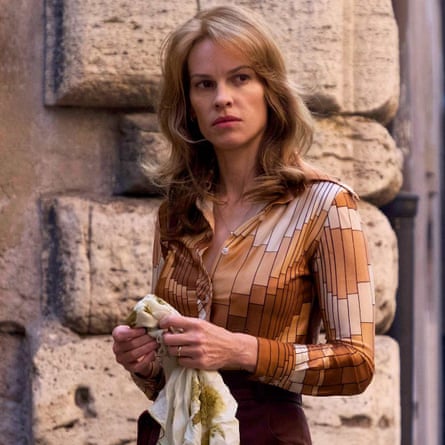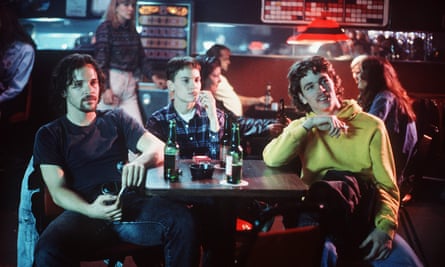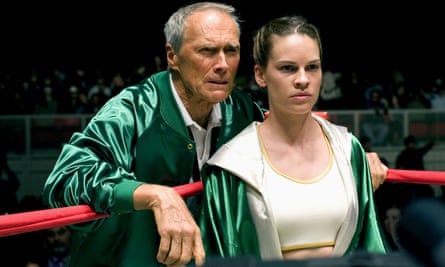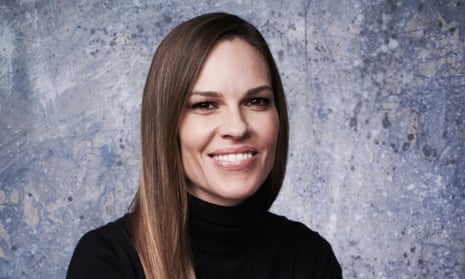Hilary Swank has already raced through a full day’s schedule before the LA restaurant where we meet has had time to switch its menu from breakfast to lunch. She has taken her father to a doctor’s appointment, held a conference call for her new clothing line, Mission Statement, and run to a meeting about one of the three TV shows she is currently producing, along with three films. “Constant everything!” she grins, looking casual and efficient in a sundress. She has arrived just in time to order a piece of salmon – to go. The two-time Oscar winner still has a lot left to accomplish.
Swank, 44, has been having a busy summer. If you haven’t seen her for a while, that is due to her making a necessary choice. Just before Christmas 2014, her father Stephen, a former chief master sergeant in the Oregon air national guard, underwent a life-saving lung transplant. For three years, Swank was his sole live-in carer, which meant saying no to Hollywood – or, as she phrases it: “I was saying yes to something else that I wanted to be a part of.”
Today, her dad is “really good,” she says. “It’s a long time coming.” So, too, is this moment in which the feverishly curious actor can finally make things happen. One of those is learning to tap dance, she says, pulling up a YouTube video of a group called the Syncopated Ladies, headed by one of her tap mentors, doing a staccato-glam routine over a Beyoncé speech about the female right to vote. “I’ve always wanted to tap dance since I was 20 – actually, since I was a teenager.” When she married the social venture entrepreneur Philip Schneider in California earlier this month, the couple surprised guests by performing a tap routine.
And, of course, she is plunging back into acting. What They Had, a sibling drama that pairs Swank with Michael Shannon, a rare performer who can match her intensity, is coming out in the US this autumn, followed by the Australian apocalypse flick, I Am Mother. First up, though, is Trust, Danny Boyle’s 10-part bleakly funny miniseries about the kidnapping of John Paul Getty III in 1973. It premieres on BBC Two next month, with Donald Sutherland as the boy’s grandfather, the miserable oil miser John Paul Getty, and Swank the show’s emotional heart as John Paul’s desperate mother Abigail “Gail” Getty.
Trust is the second retelling of the bloody saga in 12 months, after Ridley Scott’s All the Money in the World, but Swank had no reservations in following Michelle Williams’ Golden Globe-nominated performance with her own turn as the working-class mother of four who marries into the money-hungry clan. “I said: ‘Danny, pretty much you had me at hello,’” she laughs.
Gail is a terrific fit for Swank, who slips into the role as perfectly as she does her character’s shiny, burnt-orange blouses. (“I don’t know if you’d like those acrylic 70s outfits if you were in Rome in August, by the way,” she mock-groans. “You’re boiling every second of the day.”) Trust is so comically gothic it gives Sutherland a harem of cat-fighting mistresses and introduces his estate by panning across a garden full of black flowers and black geese. If that weren’t enough, minutes later one of the birds gets squashed by a car, the camera lingering over its guts.

Then Swank cruises into the frame in Gail’s green station wagon, the straight-talking princess who must break the spell her father-in-law holds over his kin – and her missing son’s life. There is a supporting turn from Brendan Fraser as Fletcher Chase, an ex-CIA agent who functions as Getty senior’s one-man wrecking crew, complete with American flag bandana around his neck and an Ennio Morricone-esque cowboy trill as his theme music. “The most harrowing things in life, there’s gotta be levity in it or it’s just too heavy,” says Swank. It is clear from her voice that she knows this firsthand.
There is some irony in Swank embracing the screwed-up Gettys, given the way she dotes on her own family. Or maybe not. “When I take a character on, I love them,” insists Swank. “They make me a better person because of it – I love that I don’t always understand how they walk in the world until I play them. And then I go: ‘Oh! What a beautiful way of seeing!’”
Gail, says Swank, was resilient, stubborn and flawed, a mother forced to ask how she contributed to her son’s fractured adolescence, which left him flitting around Italy getting high, before getting kidnapped. Gail didn’t always make the best choices, she adds, stressing that she is psychoanalysing her character and not the woman, who now lives quietly in London, and in her 80s is the same age as grandpa Getty when her son went missing. But when Gail confronts an obstacle, she rams against it until she finally muscles through. Not unlike the actor playing her.
Swank’s ambitions hit their first road bump in grade school in Bellingham, Washington, when she auditioned for the part of Baloo the bear in a class production of The Jungle Book. Her teacher insisted she portray Mowgli, because, even at nine years old, “I had this really deep, raspy voice,” says Swank. She turned to the teacher and said: “I’ll have to think about that.” Of course, she said yes, and her love of the arts took hold.
“When I was a kid, I felt like I was an outsider,” says Swank. Books and movies were her way to connect with different kinds of lives, maybe ones where people didn’t live in a trailer park in an industrial bay just south of the Canadian border. “I was from what people perceived as the wrong side of the tracks.”
Note her choice of the word “perceived”. There is a legendary story about Swank that starts six years later when, aged 15, she left Washington to chase her acting goals. She and her mother, Judy, a newly single secretary, drove south to Hollywood with just $75 in savings and spent two months living out of their car. Sometimes acquaintances will sadly tut-tut about her hungry days splitting a $1.99 breakfast with her mother, and scraping together cash for a dollar slice of pizza at night.
“I’m like: ‘No! It was awesome!’” says Swank. “It’s not a negative. It’s a memory you love because it just reminds you of pursuing something that you want. For me, I was moving to California and I was living my dream!” Plus, she smiles: “My mom really believed in me – and her belief made me believe in myself, which is everything. The best gift you can give a child.”
Not long afterwards, Swank landed a villainous role as a snotty cheerleader in the comedy Buffy the Vampire Slayer. There, she first met her Trust co-star Donald Sutherland, who was cast as a vampire-slayer coach. He gave her a tip, too. “Donald said to me: ‘Can I give you some advice?’” recalls Swank. “‘Act less with your forehead.’” She didn’t take it. “I thought: ‘How do you say ‘Puh-leeeese, that’s so five minutes ago!’ without your forehead?!” Swank jokes, crinkling her face into a caricature of Valley girl disgust.

There is a pause. Across the room, a stranger is snapping Swank without asking. She grins and shoots her a thumbs-up. “It’s like I’m part of the circus,” says Swank through her teeth, holding the smile. She is used to it, and is gracious, but you can sense the Bellingham girl inside of her will never stop thinking public attention is bizarre. The woman shows her mobile to her friends and seems to sigh that she should have got a better shot. Thankfully, she doesn’t have the gall to try again. “It’s weird when you see a camera pointed at you,” says Swank. “You kind of look around like: ‘Is there a rainbow out?’”
But that is what happens when you win two best actress Academy awards before your 30th birthday, first for playing murdered trans kid Brandon Teena in Boys Don’t Cry, and again five years later for the part of hard-living boxer Maggie Fitzgerald in Clint Eastwood’s Million Dollar Baby. “All of a sudden you’re just famous,” she says, snapping her fingers. She knew from her first Hollywood days, that stretch when she was fighting for thankless gigs on Beverly Hills 90210, that “there were no roles like that, there was nothing else like that”. So she gave all of them everything she had, and people noticed. “I don’t know what I did in this life to deserve all this,” stammered Swank on stage at the Dolby Theater with her second statuette. “I’m just a girl from a trailer park who had a dream.”
This year is the 25th anniversary of Teena’s death. I ask if trans rights have improved in that time and Swank contemplates the question seriously. “I don’t know how we define better,” she says, finally. “Expanding awareness is definitely growth. We have a long way to go still.” Boys Don’t Cry definitely changed her own life. Glaad (the Gay and Lesbian Alliance Against Defamation) applauded it as the year’s outstanding film. She was flooded with letters from people who said the film saved them, gave them the courage to come out, a map to help their parents understand – and the hope necessary to stay alive. For more than a decade, people turned to Swank as a voice for a community. She recognised that her responsibility extended far past the film’s closing credits and helped the Hetrick-Martin Institute launch its first accredited high school for at-risk LGBTQ kids.
We meet at a time when controversy is still swirling around the casting of Scarlett Johansson as a trans man in the drama Rub & Tug – Johansson later withdrew from the project, saying she had “learned a lot from the community since making my first statement about my casting, and realise it was insensitive”.
Swank says there are people, “who have said I shouldn’t have done Boys Don’t Cry”. She understands this. It is complicated, and consciousness has grown a lot in the past two decades, thanks in part to the conversation her film started, back in an era when the script didn’t even use the word transgender. “At the time, the whole community was grateful that I did it because they said, had it been someone who was from this experience, people would have said: ‘Oh, you’re just telling your personal story.’” Fewer people might have bothered to see it.

That was the uphill fight in 1999. Today’s battleground is different, having shifted from awareness to access. “What’s hard is that not everyone is given an opportunity, and that’s where I think the struggle is,” says Swank. Producers should take a risk on giving unknown trans actors a shot at stardom. The argument is often that there aren’t any trans actors who are famous enough to get a project made. But “nobody knew who I was when I did Boys Don’t Cry,” says Swank. “I was a newcomer – and the movie did well.
“The important thing to remember is people are wanting to be seen for who they are,” she adds. “And people are fighting for their space in the world. That I understand. But I do think it can be a slippery slope, because I don’t think anyone should be pigeonholed. And I do think that all genders should have an opportunity to be an actor and tell their stories. And I think that all genders should have the opportunity to audition for all types of roles. I was honoured to be a part of the beginning of an important conversation. The community means a great deal to me.” And that conversation is ongoing, and will be for a while. “We all have the underlying sameness of wanting to be loved; to give love, to receive love. We all experience pain. It might be from different circumstances, but the pain is the same.”
“I love people who persevere through adversity,” she says. Brandon. Maggie. Gail. Amelia Earhart. She played the aviator in 2009, the woman whose bones it was recently claimed had been found – again – on the Pacific island of Nikumaroro. Swank rolls her eyes. “They say that every week! I think she’s perhaps at the bottom of the ocean somewhere.”
She would love to do an action movie soon, something “just flat-out entertaining”. Maybe someone will give her an excuse to tap dance. Either way, she is glad she has emerged from seclusion at a time when Hollywood is ready for more of the kind of female characters she has spent her career fighting to play. “Now there are more offers coming in than there ever have been.” So it is up to her, as an actor and an increasingly busy producer, to make the right choices. No stress, she shrugs, grabbing her to-go lunch as she heads to her next challenge. She has been ready for this since she was a kid tearing through a stack of Choose Your Own Adventure books.
“Once I chose my adventure, I didn’t go: ‘Well, what would happen if I had gone that way?’” Swank laughs. “I was enjoying the journey I was on.”
This article was amended on 31 August to correct the name of Hilary Swank’s husband.
Trust starts on 12 September on BBC Two at 9pm. It will also be available as a boxset on BBC iPlayer

Comments (…)
Sign in or create your Guardian account to join the discussion